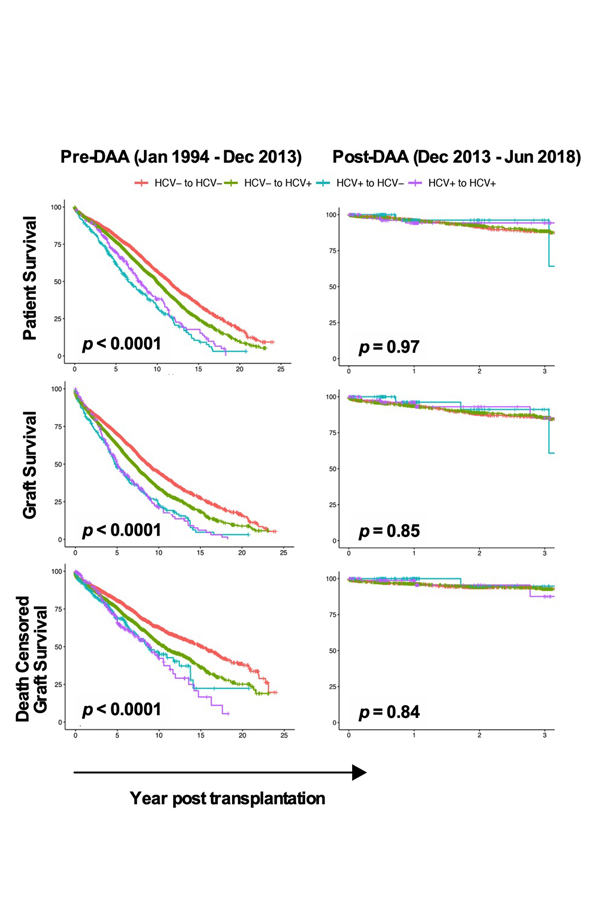The Effect of Hepatitis C Virus Infection on Kidney Transplant Outcomes in the Era of Direct-Acting Antiviral Therapy
*Qing Yuan1,2, *Shanjuan Hong1, *Andric Perez-Ortiz1, *David C. Chang1, Joren C Madsen1,3, Nahel Elias1,4
1Transplant Center , Massachusetts General Hospital, Boston, MA;2Organ Transplant Institute, 8th Medical Center, Chinese PLA General Hospital, Beijing, China3Division of Cardiac Surgery, Massachusetts General Hospital and Harvard Medical School, Boston, MA;4Division of Transplantation, Department of Surgery, Massachusetts General Hospital and Harvard Medical School, Boston, MA
Objective: To investigate effects of Hepatitis C Virus (HCV) infection in kidney recipients and kidney donors before and during the era of direct-acting antiviral (DAA) therapy.
Design: Mate-kidney analysis of a retrospective cohort study from the Organ Procurement and Transplantation Network (OPTN) as of September 2018.
Setting: National database of all kidney transplant programs in the United States
Patients: HCV+ and HCV-
adult recipients of first solitary kidney transplants from ABO-compatible HCV+ or HCV- deceased donors between January 1, 1994 and June 30, 2018 in the US. We selected donors where one kidney transplant recipient was HCV seropositive and the mate kidney recipient was HCV seronegative.
Main Outcome Measure: Patient and graft survival, and death-censored graft survival (DCGS).
Results: 4071 HCV positive and 347 negative donorís mate kidneys were transplanted in HCV discrepant recipient. HCV positive recipients of HCV negative donor had worse patient and graft survival (aHR: 1.191.291.39, 1.191.291.39, respectively) and DCGS (aHR: 1.151.241.33). Similar patient and graft survival and DCGS were found in recipients of HCV positive donors, regardless of recipient HCV status. The risk associated with HCV positivity in donors or recipients in the pre-DAA era (before Dec 2013) was no longer statistically significant in the post-DAA era (p = 0.97, 0.85, 0.84, for patient-, graft-survival, and DCGS, respectively).
Conclusion: Given improved outcomes of HCV positive kidneys in recipients with or without HCV, broader utilization of HCV positive kidneys should be advocated in the post-DAA era. 
Back to 2019 Abstracts




